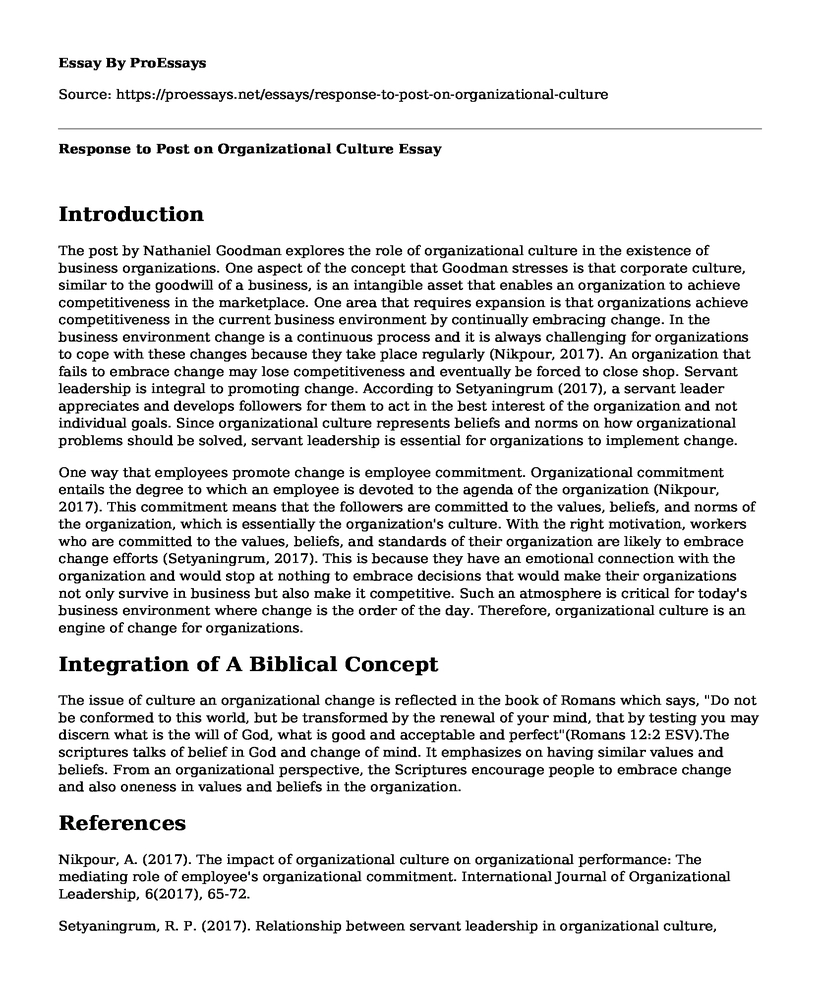Introduction
The post by Nathaniel Goodman explores the role of organizational culture in the existence of business organizations. One aspect of the concept that Goodman stresses is that corporate culture, similar to the goodwill of a business, is an intangible asset that enables an organization to achieve competitiveness in the marketplace. One area that requires expansion is that organizations achieve competitiveness in the current business environment by continually embracing change. In the business environment change is a continuous process and it is always challenging for organizations to cope with these changes because they take place regularly (Nikpour, 2017). An organization that fails to embrace change may lose competitiveness and eventually be forced to close shop. Servant leadership is integral to promoting change. According to Setyaningrum (2017), a servant leader appreciates and develops followers for them to act in the best interest of the organization and not individual goals. Since organizational culture represents beliefs and norms on how organizational problems should be solved, servant leadership is essential for organizations to implement change.
One way that employees promote change is employee commitment. Organizational commitment entails the degree to which an employee is devoted to the agenda of the organization (Nikpour, 2017). This commitment means that the followers are committed to the values, beliefs, and norms of the organization, which is essentially the organization's culture. With the right motivation, workers who are committed to the values, beliefs, and standards of their organization are likely to embrace change efforts (Setyaningrum, 2017). This is because they have an emotional connection with the organization and would stop at nothing to embrace decisions that would make their organizations not only survive in business but also make it competitive. Such an atmosphere is critical for today's business environment where change is the order of the day. Therefore, organizational culture is an engine of change for organizations.
Integration of A Biblical Concept
The issue of culture an organizational change is reflected in the book of Romans which says, "Do not be conformed to this world, but be transformed by the renewal of your mind, that by testing you may discern what is the will of God, what is good and acceptable and perfect"(Romans 12:2 ESV).The scriptures talks of belief in God and change of mind. It emphasizes on having similar values and beliefs. From an organizational perspective, the Scriptures encourage people to embrace change and also oneness in values and beliefs in the organization.
References
Nikpour, A. (2017). The impact of organizational culture on organizational performance: The mediating role of employee's organizational commitment. International Journal of Organizational Leadership, 6(2017), 65-72.
Setyaningrum, R. P. (2017). Relationship between servant leadership in organizational culture, organizational commitment, organizational citizenship behaviour and customer satisfaction. European Research Studies Journal, 20(3), 554-569.
Cite this page
Response to Post on Organizational Culture. (2022, Dec 05). Retrieved from https://proessays.net/essays/response-to-post-on-organizational-culture
If you are the original author of this essay and no longer wish to have it published on the ProEssays website, please click below to request its removal:
- Paper on Management: Organizational Leadership and Its Structures
- Critical Evaluation of the Human Resource Strategy of Goody's LLC
- Essay Sample on Successful Leadership Traits
- Creative Profile Thinking - Paper Example
- Essay Example on Achieving and Adjusting Change: A Gradual Process of Success
- Essay Sample on Promoting Health & Reducing Risk: Basics of Community/Public Health
- Ethical Theories: Foundations Of Decision Making - Essay Sample







